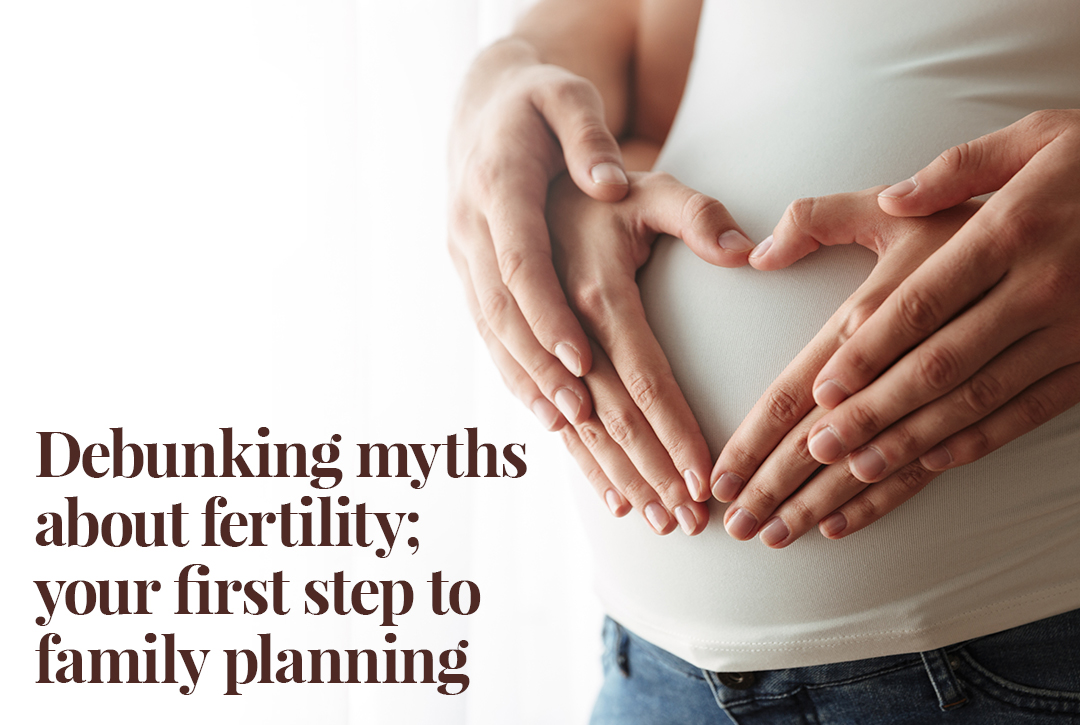Debunking myths about fertility; your first step to family planning

No matter which stage of your relationship you and your partner are at, it is important for couples to take the first step in family planning together and understand what to expect prior to conception and pregnancy. We all know that dietary and lifestyle choices made during pregnancy has a significant effect on the baby, but what about the choices made before pregnancy? Let’s debunk some myths about fertility and how you can manage pre-pregnancy choices in a healthier way.
Conceiving is easy
Did you know that the chances of conceiving naturally before an individual reaches 35 years of age is only 15%? The chances of conception start to decline by half after 35 and may drop to 4% by the age of 41 years old and above. Aside from age, conditions such as sperm quality and timing of ovulation need to be optimal in order for a successful pregnancy to happen. Other factors such as weight and lifestyle habits also play a part in conception.
I do not have infertility if I have a regular menstrual cycle
Having a regular menstrual cycle may be a positive indication of ovulation but it is still not a guarantee. Did you know that women can have regular periods without ovulation? Without ovulation, a woman may be unable to conceive naturally.
It is harder to conceive after taking contraceptive pills
If you have been on contraceptive pills for many years, it may take a while for your periods or ovulation to restart again. However, if you are also on other medications concurrently to the use of contraceptives, such as medication for thyroid or renal conditions, you may want to consult with a doctor on how they may affect your pregnancy journey.
On the other hand, it is important to monitor your menstrual cycle closely after you stop using birth control. If your cycles do not become regular after 3-4 months, it is best to consult a gynaecologist for further investigation as the pills may have masked signs of other conditions such as polycystic ovary syndrome (PCOS) or low egg reserves.
Only women face issues of infertility
Infertility can happen to both men and women. 20% of infertility cases are due to female causes, 20% of male causes and 20% are due to a combination of male and female causes.
While it is true that the women’s age plays a big factor in fertility, did you know that the infertility rates among men increases with age as well? The volume of the semen produced and the motility of the sperm reduces when men are aged 40 years old and above.
While women may face other issues such as the lack of ovulation, blocked fallopian tubes, fibroids and endometriosis, men also face medical conditions such as sperm abnormalities, anatomical problems, hormonal imbalances and libido issues.
As men get older, the risk of high blood pressure, heart disease and diabetes increases as well. These not only affect general health, but also the quality and quantity of semen produced.
Eating certain food may affect fertility
You may have heard some myths associating certain food such as yams or soy affecting your fertility. There is no scientific evidence that these food affect fertility. However, moderate to heavy consumption of alcohol and caffeine have been associated with poorer fertility in men.
That being said, certain nutrients such as folic acid do play a role in facilitating a smoother pregnancy for women. Folic acid helps in the development of the child’s brain and spinal cord, and is recommended to be taken when you are trying to conceive and at the start of pregnancy.
All in all, following a healthy and balanced dietary habit is a good practice to maintain your health and ensure your body gets the nutrients it needs for conception and before pregnancy.
In-vitro fertilisation (IVF) is the only treatment option for infertility
There are multiple options available aside from just IVF. There are ovulation induction medications, intrauterine insemination programme, surgery to correct anatomical barriers to conception and even traditional Chinese medicine methods just to name a few. Each treatment options differ for each couple. It is best to undergo a thorough fertility assessment where your doctor can advise which treatment is better suited for you and your partner.

It is never too early to start preparing your body for pregnancy, even when you and your partner are still trying for a baby. Whether it is your first or subsequent pregnancy, here are some additional pre-conception tips to keep your body and baby healthy.
- Make healthy food choices and cut down on junk food.
This ensures your body is well-nourished. - Maintain a healthy BMI.Being overweight or underweight may have an impact on your health and fertility.
- Cut down on unhealthy lifestyle habits such as smoking and excessive alcohol consumption.
This reduces the risk of fertility complications from both parents as well as during pregnancy. - Go for a health examination and fertility assessment to better assess both you and your partners’ health and risk factors.
- Get vaccinated to protect and prevent you and your future baby from infection and vaccine-preventable diseases.
On average, most couples take about 6-12 months to conceive. Infertility is generally defined when a couple is not being able to conceive after 12 months of unprotected sexual intercourse. It is not uncommon and you may have come across various internet sources and received advice from family and peers. However, it is still essential to seek medical advice and get the correct diagnosis with the help of a doctor. From the modern advances in technology to traditional and holistic treatment options, there is still hope for couples who are trying to conceive
Article reviewed by Dr Sheila Loh Kia Ee, Clinical Director, Fertility, Raffles Women’s Centre, Specialist in Obstetrics & Gynaecology.



















